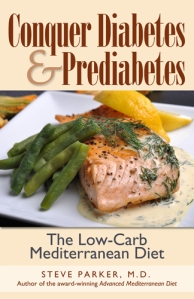Ketogenic diets have seen a resurgence in the last two decades as a treatment for childhood epilepsy, particularly difficult-to-control cases not responding to drug therapy. It works, even in adults. That’s why some brain experts are wondering if ketogenic diets might be helpful in other brain disorders, such as Alzheimer’s disease and Parkinson’s disease.
I’ll save you some time and just give you the conclusion of a 2006 scientific article I read: maybe, but it’s way too soon to tell.
![]() The article is called “Neuroprotective and disease-modifying effects of the ketogenic diet,” from researchers at the National Institutes of Health’s National Institue of Neruological Disorders and Stroke. Sounds promising doesn’t it?
The article is called “Neuroprotective and disease-modifying effects of the ketogenic diet,” from researchers at the National Institutes of Health’s National Institue of Neruological Disorders and Stroke. Sounds promising doesn’t it?
The article goes into detail about how the ketogenic diet might be good for brain health. Dr. Emily Deans would be very interested in that, but most of my readers not. Two-and-a-half pages on non-human animal studies, too.
What is this “ketogenic diet” for epilepsy?
The most common ketogenic diet for childhood epilepsy is the one developed by Wilder in 1921. It was a popular treatment for epilepsy in the 1920s and 1930s. Fats provide 80 to 90% of the calories in the diet, with sufficient protein for growth, and minimal carbohydrates. Since carbs are in short supply, the body is forced to use fats as an energy source, which generates ketone bodies—acetoacetate, acetone, beta-hydroxybutyrate, largely from the liver.
So what?
Not much. This article may have been written to stimulate future research, and I hope it does. I just searched PubMed for “ketogenic diet AND Alzheimer” and came up with nothing new since 2006.
Could the Ketogenic Mediterranean Diet prevent or alleviate Alzheimer’s disease? At this point, just flip a coin.
Reference: Gasior M, Rogawski MA, & Hartman AL (2006). Neuroprotective and disease-modifying effects of the ketogenic diet. Behavioural pharmacology, 17 (5-6), 431-9 PMID: 16940764




Hah – yes, I looked it up not too long ago and found only some case studies and stories on the Internet. Interesting idea, though, and one I hope that sparks further research, as there are no great alternatives, either, treatment-wise.
There are a lot of new studies on ketogenic diets and epilepsy (I get a few new hits every month on pubmed), and also some recent work on ketogenic diets and cancer – that area looks very exciting. Obviously ketogenic diets are without a doubt cheaper and safer than most chemotherapy regimes. What if they worked?
I don’t know about a ketogenic diet/Alzheimer’s being studied but apparently they are looking into medium chain triglycerides. I read quite some time ago about Dr. Mary Newport in Florida who was desperately looking for something to help her husband, whose Alzheimer’s was progressing rapidly. She tried to get him into studies but he was too advanced. So she started researching herself and found they were looking into MCT oil. She found that coconut oil had the same properties and it helped her husband tremendously. I’ve always wondered if she also looked into the statins, since he was on one at the time. Getting him off statins might also have helped tremendously….
Hi, DarMA. I heard about that MCT oil case report, too. We need a number of similar cases before we can start to draw any firm conclusions. If it sounds too good to be true…
-Steve
I think it’s much better than a coin flip, Steve.
First, a likely mechanism for Alzheimer’s is infectious disease, and ketogenic diets promote neuronal autophagy, which is the central process in intracellular immunity. I discussed this possibility here.
Second, ketogenic diets have delivered benefits for Alzheimer’s patients in clinical tests. See, e.g.,
Henderson ST et al. Study of the ketogenic agent AC-1202 in mild to moderate Alzheimer’s disease: a randomized, double-blind, placebo-controlled, multicenter trial. Nutr Metab (Lond). 2009 Aug 10;6:31. Pubmed link.
Costantini LC et al. Hypometabolism as a therapeutic target in Alzheimer’s disease. BMC Neurosci. 2008 Dec 3;9 Suppl 2:S16. Pubmed link.
Reger MA et al. Effects of beta-hydroxybutyrate on cognition in memory-impaired adults. Neurobiol Aging. 2004 Mar;25(3):311-4. Pubmed link.
Ketones also can deliver immediate benefits by relieving neuronal hypoglycemia. E.g. here.
Best, Paul
Paul, thanks for the references.
-Steve
Steve,
I’ve enjoyed your writings for some time now. One of the ways I’ve been able to connect with my elder relatives regarding passing on the benefits of an evolutionary diet is to highlight the research/benefits that show this diet is a defense against the onset of Alzheimer’s. I believe this is an excellent post summing up this subject, and I plan on passing it on. Thanks.
Best Regards,
Zach
Zach, thanks for the compliment.
-Steve